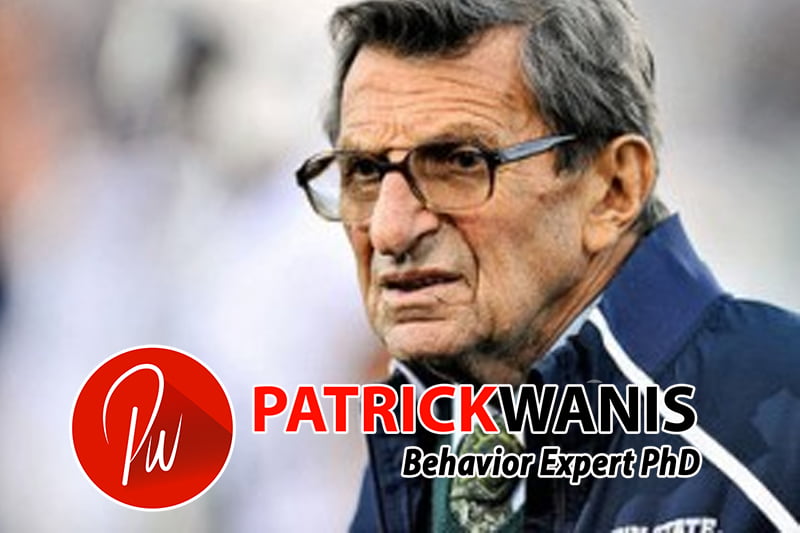
In this week’s Success Newsletter, I would like to reveal the one critical lesson that we can all learn from the passing of Joe Paterno – one of the greatest football coaches whose legacy has been marred by his admission of insufficient efforts to prevent alleged child abuse.
First a quick update:
“Twitter updates”
Follow me on Twitter – follow me and have access to regular insights and revelations and the link to my weekly newsletter as soon as it is published – Twitter: @Behavior_Expert
“Self-help scams and greed”
The self-help movement is no longer about liberating people but rather having consumers and followers surrender themselves and their money to the leaders of a movement who are now more interested in helping themselves to money and power than they are in helping individuals to actually liberate and empower themselves. Listen to the interview I gave to Laurel Morales of National Public Radio: Self-help scams and greed
Now, let’s talk about the critical lesson from Joe Paterno – one of the greatest football coaches in the US whose legacy has been marred by his admission of insufficient efforts to prevent alleged child abuse.
For people outside the US, Joe Paterno is a legendary Penn State University ex-football coach who died this past Sunday of lung cancer at 85 years of age. Paterno had a profound impact on thousands of lives: he had 409 career victories (a Football Bowl Subdivision record) and he coached the Penn State Nittany Lions for 46 years. But Paterno was also recognized as a great and honorable man – a father figure to many of his players.
But Paterno’s image was tarnished by a sex abuse scandal linked to Penn State.
In 2011, Penn State’s former assistant football coach Jerry Sandusky was charged 52 criminal counts for sexually molesting young boys over a 15-year period. (1994 – 2009) and school administrators were criticized for knowing about the allegations but doing nothing. Sandusky has pleaded not guilty and Penn State legendary football coach Joe Paterno was fired for failing to take more action; Jerry Sandusky was Joe Paterno’s most trusted assistant for the majority of three decades.
Paterno went on to admit that he felt guilty that he had not done more to prevent the alleged abuse.
In my article “Penn State – false gods, anger and morality” I reveal three key lessons for all of us including 1. We need to use courage and anger to protect victims 2. There is a difference between “Legal obligation versus moral obligation: Do what is right.” When we see a wrong, we need to do something about it.
And this leads to the greatest lesson for all of us from Joe Paterno’s experiences and life.
Yes, Joe Paterno was the winningest coach in Division I college football – FBS. Yes, he was recognized as a great father and husband.
And yes, we expected more from him.
But what did we expect?
The same thing we expect from all people that we place on pedestals – perfection.
But perfection is also often the very same thing we expect from everyone around us.
“Joe Paterno was a man so rich in virtue and good intentions, and was virtually flawless by every standard but one. The truth is, he could have, and should have done more to put an end to Sandusky’s horrendous crimes. So, for me at least, he will never be in the conversation of absolute saints. People can slip up and have faults, but unfortunately, the severity of Paterno’s mistake is too heavy to overlook.” – Sam Hofberg, sports columnist.
https://www.sportsrageous.com/what-to-make-of-joe-paternos-death-01-25-2012
Every client I have ever worked with has struggled with forgiveness, imperfection and accepting that we are all human beings. In other words, we are all imperfect and we will all make mistakes. Yes, there are consequences for our actions and for our mistakes and wrongdoing. But one of the greatest challenges we all face in life is accepting that we are flawed; we and everyone else around us.
Accepting imperfection does not mean condoning, ignoring or promoting wrongdoing but, it does mean learning to forgive and accept ourselves and our flaws.
When we cannot accept that people are imperfect (our parents, siblings, wife, husband, boss and friends), we not only destroy our relationships, we destroy the love and we suffer as a host of negative emotions begin to overpower us. Again, let me clearly state that there are boundaries and you must decide what you will and won’t accept in a romantic, social or business relationship.
We often cry out, pray, dream about or seek out unconditional love. We often demand it from our partner: ‘love me no matter what…accept me as I am…give to me without measure or condition.’ But how often do we do the same to the other person?
It’s not easy to love unconditionally, is it?
Philosophers, teacher and spiritual leaders will tell you that our natural state, our pure state is love – unconditional love. But what everyone often omits to remind us is that we are all imperfect. And the reason we struggle so desperately with expressing unconditional love is that we are humans, we make mistakes and we are imperfect and flawed and therefore we often love conditionally not unconditionally.
The paradox is that it is our flaws – our human state of imperfection that is the barrier to our ability to express unconditional love, which is our ideal version of love, our vision of perfect love.
To experience more love in our life, to get closer to experiencing unconditional love, we must begin with ourselves: loving and treating ourselves the way we want to be treated; accepting and forgiving ourselves for the wrong and stupid things we do, have done and will do.
The great teaching is “Love thy neighbor as thyself.” To love someone else, we must love ourselves; to be kind, forgiving, patient and gentle with someone else, we must kind, forgiving, patient and gentle with ourselves, for the way we treat others is the way we treat ourselves and vice versa.
Become aware of the way you judge others, for it is simply a reflection of the way you judge yourself. Begin now to love and accept yourself and you will see it mirrored in the way you treat others.
For forgiveness of self, consider using these products: Getting Over It- Breakups, Betrayals & Rejection: Feel Good About Yourself and Be More Confident (includes visualizations for forgiveness):
You can comment on this newsletter directly below.
If this newsletter was forwarded to you and would like to receive all of my newsletters please enter your email address on the home page.
I wish you the best and remind you “Believe in yourself -You deserve the best!”
Patrick Wanis Ph.D.
Celebrity Life Coach, Human Behavior & Relationship Expert & SRTT Therapist
www.patrickwanis.com
Anointed “The Woman Expert” by WGN Chicago, Patrick Wanis PhD is a renowned Celebrity Life Coach, Human Behavior & Relationship Expert who developed SRTT therapy (Subconscious Rapid Transformation Technique) and is teaching it to other practitioners. Wanis’ clientele ranges from celebrities and CEOs to housewives and teenagers. CNN, BBC, FOX News, MSNBC & major news outlets worldwide consult Wanis for his expert insights and analysis on sexuality, human behavior and women’s issues. Wanis is the first person ever to do hypnotherapy on national TV – on the Montel Williams show.

